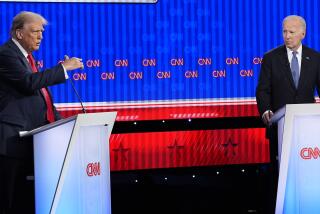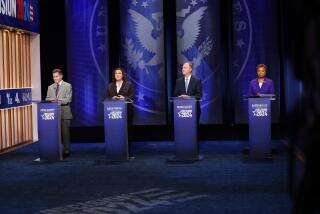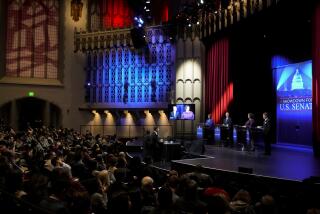Candidates Go On Attack in Debate
- Share via
MANCHESTER, N.H. — The leading Republican presidential contenders battled over ethics and negative advertising Thursday night in a televised debate that also dramatically demonstrated Patrick J. Buchanan’s rising prominence in the struggle for the nomination.
The 90-minute televised encounter underscored both the increasing personal tension between the remaining contenders--and the extent to which Buchanan’s agenda of combative economic nationalism is moving to the center of the campaign dialogue.
With its free-for-all of charges aimed at Sen. Bob Dole of Kansas--and the confident performance by Buchanan--the debate seemed to reinforce the existing dynamic of a race in which Dole is struggling to hold on to a lead while Buchanan, and to a lesser extent, Lamar Alexander, gain ground.
The debate’s most dramatic moments came from personal confrontations. Buchanan and Alexander upbraided Dole over new negative ads he has launched against them here. And Steve Forbes, looking to revive his sagging campaign, accused Alexander of benefiting from a sweetheart investment.
But the policy disagreements in this lively and contentious debate focused primarily on Buchanan’s ideas--particularly his calls for limiting foreign imports as a means of improving living standards for the middle class. That focus was a sure sign of Buchanan’s growing strength: When the Republican contenders last debated in Iowa in mid-January, the candidates directed most of their fire at Forbes, who at that time was ascending in the polls. This time Forbes, whose support has sharply dropped here, was virtually an afterthought.
Dole turned in a low-key and bland performance that emphasized his experience and solidity more than any burning policy preferences. In his opening statement, he planted his flag firmly on the terrain of caution: “I will be a good mainstream conservative president,” he said, “with a lot of good ideas about America’s future.”
In the debate, Forbes tried to reestablish his identity as a Washington outsider, portraying his ideas--the flat tax, medical savings accounts, diverting part of the payroll tax into individual retirement accounts--as a means of “returning control to the people.”
Alexander continued his efforts to thread the needle between the rest of the field--offering himself as a candidate more experienced than Forbes and more electable than Dole or Buchanan. Alexander called himself the candidate of “new ideas” and recited a few of them: turning over control of welfare to cities and private charities, replacing federal job training programs with new vouchers.
Alexander also demanded that Dole withdraw a new ad attacking him as a “liberal.” Buchanan later echoed that demand, calling on Dole to renounce an ad attacking his views as “extreme.”
“Sen. Dole, you are better than your negative ads,” Alexander said when the debate was only a few minutes old. “Why don’t you pull them off? Why don’t we talk about new ideas and our future?”
Buchanan accused Dole of employing “the cuss words of the establishment” in labeling him an extremist and charged Dole with mounting a hostile phone bank operation that distorts his positions.
“If I’m an extremist, why are you pirating my ideas and parroting my rhetoric?” Buchanan asked. “Where did you get that idea for the cultural war for the soul of America, my friend? Where did get these other ideas about corporate greed? . . . I don’t think you can call us an extremist when you’ve become a pretty good echo of Pat Buchanan.”
Dole never directly responded. But he defended his ads against Alexander by noting that the former Tennessee governor “ran the first negative ads in the state”--commercials aimed at California Gov. Pete Wilson.
Later, Dole defended his earlier ads against Forbes by noting that the wealthy magazine publisher had “pounded” him with negative ads. “You’ve got a lot of money. You want to buy this election. But this election’s not for sale,” he growled at Forbes.
Continuing the mea culpa he has engaged in since his disappointing fourth-place finish in Iowa, Forbes said he “made a mistake in Iowa” by airing too many negative ads.
But Forbes prefaced those remarks in an unusual fashion: by launching the most pointed attack any candidate has yet made against the ethics of Alexander--who is competing directly with Forbes for the allegiance of moderate and independent voters.
Forbes noted that Alexander labels him a “Wall Street insider” in his own ads. Then he compared an investment that netted Alexander huge profits to Hillary Rodham Clinton’s cattle futures trades, which brought her about $100,000 in profits during the late 1970s.
“Well, as a Wall Street insider, many of us were impressed when Hillary Clinton turned $1,000 into $100,000,” Forbes said. “I was really astonished when I learned, that as governor, Gov. Alexander turned $1 into $620,000. So when he says ‘ABC,’ that ‘Alexander Beats Clinton,’ what he meant was not Bill Clinton but Hillary Clinton.”
Forbes’ attack involved an investment Alexander made in 1981 during his first term as governor as part of a group of investors who each paid $1 for an option to purchase the Knoxville Journal newspaper at a price of $15 million. The group later sold the newspaper to Gannett Co.--yielding a $620,000 profit for Alexander.
Alexander fired back by calling on Forbes to release his tax returns and by defending the deal.
Apart from the personal accusations, the debate focused to an extraordinary extent on Buchanan’s economic agenda, with Buchanan deflecting the criticism of his ideas far more vigorously than Forbes had done when the rival candidates piled on his flat tax in the Iowa debate last month. By contrast, the candidates said relatively little about balancing the budget or shrinking the government--the themes that preoccupied both them and the Republican Congress through 1995.
Instead, they struck notes traditionally more common to Democrats, lamenting the economic squeeze on middle-class families.
Alan Keyes caught the sense of ideological vertigo, chastising Buchanan and Dole for “sounding like a bunch of socialists, not a bunch of Republicans.”
Keyes’ remarks had no appreciable effect on Buchanan, who continued to lash Dole for supporting the North American Free Trade Agreement, the world trade treaty known as GATT, and, especially, the Clinton administration’s program to lend Mexico tens of billions of dollars to avoid default.
“Bob, when Citibank, Chase Manhattan and Goldman Sachs got into trouble, you turned into a protectionist with Bill Clinton,” Buchanan charged. “Why didn’t you let those fellows test the magic of the marketplace like you want American workers to do?”
Dole mustered his greatest passion of the evening in defending himself against Buchanan. “We shouldn’t play on people’s fears; we ought to play on their hopes and their aspirations,” he said.
Dole defended the loan to Mexico by arguing that if its economy had collapsed, “there would have been millions and millions of Mexicans coming across the border” as illegal immigrants. He charged that Buchanan’s calls for higher tariffs would devastate New Hampshire.
“We’ve got about 1,000 companies in New Hampshire that export,” Dole said. “They couldn’t do that if you had Pat Buchanan’s theory.”
Alexander also denounced Buchanan’s protectionist agenda, but nodded in the direction of the protectionist constituency by distantly echoing Democratic Rep. Richard A. Gephardt’s rhetoric of his 1988 presidential campaign. America should demand that Japan “let us run around in your market just like we let your Toyota sellers run around in our market,” he said.
Only Sen. Richard G. Lugar of Indiana and Forbes gave a virtually unqualified defense of the free-trade position that has dominated Republican thought since the 1950s.
“We tried high tariffs in the past,” Forbes said. “We tried isolationism in the past, and we got a Great Depression as a result.”
Times staff writers Michael A. Hiltzik and John M. Broder contributed to this story.
* RELATED STORY: A5
More to Read
Get the L.A. Times Politics newsletter
Deeply reported insights into legislation, politics and policy from Sacramento, Washington and beyond. In your inbox twice per week.
You may occasionally receive promotional content from the Los Angeles Times.









